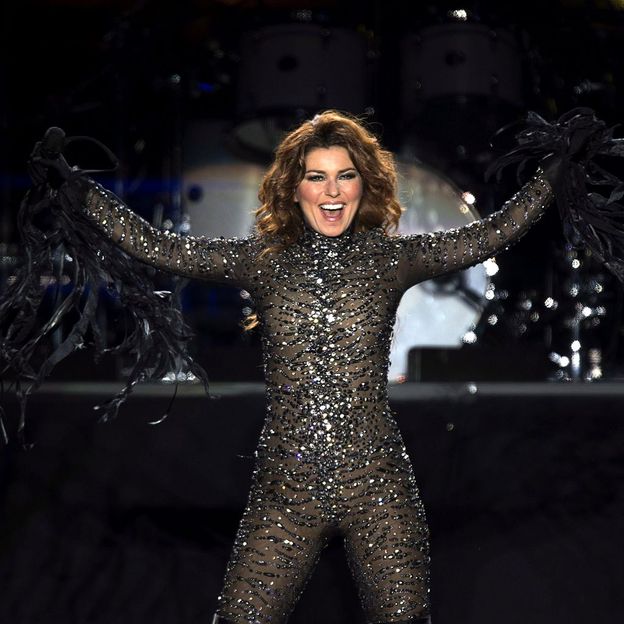Already a legend thanks to 90s mega-hits including LP Come On Over, Twain is now popular with a new generation of fans and musicians. Nick Levine looks at why she is riding so high.
It’s not unheard of for so-called “heritage acts” to enjoy an unexpected revival: Fleetwood Mac’s Dreams went viral on TikTok in 2020, and Kate Bush returned to the charts last year after Running Up That Hill was featured in the TV series Stranger Things.
But Shania Twain, an artist who could easily have stayed tied to the 1990s – the decade in which she became a global superstar by making an unprecedented crossover from country to pop – has been embraced as a Gen Z icon without an obvious “eureka!” moment. With her sixth album Queen of Me being released today, her timeless music is not only a firm favourite of younger listeners but hailed as an influence by a swathe of current hitmakers.
Among them are US indie-pop group Muna, who have said that Twain’s country-pop style directly informed Kind of Girl, a wistful, guitar-led highlight from their eponymous 2022 album. “It’s easy to take for granted the idea of country-pop as a widely beloved style of music,” the trio collectively tells BBC Culture. “And [it’s] easier for many to forget that this particular genre wouldn’t likely exist in the way it does now without the deeply profound influence of Shania Twain and her many, many hits. She is the template.”
This is far from an exaggeration: in 2021, Taylor Swift credited Twain in a TikTok for setting the blueprint for her own country-to-pop crossover. The Canadian singer-songwriter has also been celebrated by Harry Styles, who invited her to duet with him at last year’s Coachella music festival. “I think both in music and fashion, [my] main influence was probably Shania Twain. I think she’s amazing,” Styles said in 2017. And acclaimed Japanese-British singer-songwriter Rina Sawayama has called Twain “the queen of country-pop”; Sawayama even begins her country-influenced 2022 single This Hell by quoting Twain’s rallying cry from Man! I Feel Like a Woman!: “Let’s go girls!”

Twain’s revival is all the more remarkable because Queen of Me is only her second studio album since 2002. Giddy Up!, its thumpingly infectious second single, features a cute nod to the decade in which Twain began her imperial phase: “I got a fast car with the ’90s on,” she sings. And what an imperial phase it was: in the US, Twain remains the only female artist in history to have three consecutive albums certified diamond for sales of 10 million apiece. Twain’s white-hot streak began with 1995’s The Woman in Me, then continued with 1997’s Come On Over and 2002’s Up!.
The latter was so designed with global domination in mind that Twain released it in three different versions: “red” with pop-focused production, “green” with a country twang, and “blue” with an international flavour. It was a move that oozed confidence.
However, the jewel in Twain’s crown is undoubtedly Come On Over, an era-defining blockbuster that is still the best-selling LP of all time by a solo female artist. On its way to shifting an estimated 40 million copies worldwide, it yielded two country ballads that remain radio and karaoke staples to this day: From This Moment On and You’re Still the One. It also spawned two unstoppable pop-crossover hits with indelible music videos.
If someone asked you to picture Shania Twain, you would probably imagine her hitchhiking across the desert in a hooded leopard-skin suit – her signature look from the That Don’t Impress Me many videos, which is now on display in the Country Music Hall of Fame and Museum in Nashville.
If not, you might visualise her in the empowering Man! I Feel Like a Woman! promo: here she rocks fishnet stockings, a black corset and a top hat as she marshals an all-male backing band in a gender-reversed homage to Robert Palmer’s Addicted to Love.
Both Man! I Feel Like a Woman! and That Don’t Impress Me many showcases what Muna characterise as a “highlight” of Twain’s songwriting style – namely, “the importance of being funny and playful”. “OK, so you’re Brad Pitt,” she deadpans on the latter before delivering the iconic payoff: “That don’t impress me much!” During her imperial phase in particular, Twain was never afraid to punctuate her song titles with idiosyncratic exclamation marks and parentheses. I’m Not in the Mood (To Say No)! from Up! is quintessential Twain: you can tell it’s her from the title alone.
Her particular songwriting gifts
This utterly unselfconscious exuberant streak is one of Twain’s many gifts as a songwriter. Another is her ability to express universally relatable sentiments in a way that feels fresh and definitive. When she sings “You’re still the one I kiss goodnight” on You’re Still the One, she is essentially crystallising an entire relationship into just eight words.
She also has a nifty turn-of-phrase, as exemplified by the way she gently scolds a jealous lover on Don’t Be Stupid (You Know I Love You): “You even get suspicious when I paint my nails, it’s definitely distracting the way you dramatise every little small detail.” In this sense, Twain is arguably the Fleetwood Mac of the 1990s and early 2000s, though her own songwriting style is generally lighter.
At times, however, she has released darker and more cathartic music, most notably on her 2017 comeback album Now. Penned by Twain without co-writers, it features several downbeat songs about the breakdown of her marriage to music producer Robert John “Mutt” Lange, who worked with her on The Woman in Me, Come On Over and Up!. “Poor me this, poor me that, why do I keep looking back?” Twain sings on Poor Me. “Still can’t believe he’d leave me to love her.” The “her” she is most likely referring to is Twain’s former best friend and secretary, Marie-Anne Thiébaud, with whom Lange had an affair.
One of my favourite things is playing Man! I Feel Like A Woman! at a predominantly heterosexual event and watching all the otherwise cautiously ‘masculine’ straight men lose their inhibitions – Lady Lloyd
But more often than not, Twain has kept her fanbase squarely at the front of her mind. Discussing Queen of Me in a recent interview, Twain said quite revealingly: “It’s very chirpy, and that’s intentional.
It’s more playful than I’ve ever been. I can write really sad songs, but do my fans want to hear really sad songs from me?” For Muna, “it’s also so clear in listening to [Twain’s] music [from her imperial phase] now that she had a female audience in mind and wasn’t afraid of just telling stories that would appeal to them”.
By the time she released Come On Over in 1997, Twain was already rich and famous, but she was still more than capable of pouring her working-class upbringing into empathetic songs with everywoman appeal. “With all this stress I must confess, this could be worse than PMS,” she sings on Honey I’m Home, an uplifting number about making it through the daily nine-to-five.

Though it would be reductive to portray the country music scene that Twain came up in as entirely patriarchal, it is fair to say that overt displays of female sexuality would have been risky. Twain was keenly aware of this, which is why she delivered Up!’s irresistible lead single I’m Gonna Getcha Good! with a wink.
“You’re a fine piece of real estate and I’m gonna get me some land,” was a come-on that was far too fun to frighten the horses. On In My Car (I’ll Be the Driver), another standout track from the same album, she asserts herself in a way that won’t offend a potentially fragile male ego by singing: “I don’t mind if you think you’re the strong one, oh babe, it’s okay.”
Twain’s feminism may be measured, but it is never mealy-mouthed. “She makes it clear in her songs that she won’t take any bullshit,” Muna points out. This is definitely true of (If You’re Not in It for Love) I’m Outta Here!, a foot-tapping banger from The Woman in Me that was one of Twain’s early hit singles.
Here, she comprehensively skewers the all-too-predictable chat-up lines used by men with one thing on their mind. “He says come be a star in the back seat of my car,” she sings. “Oh but baby slows down, you’re goin’ way too far.” It is worth remembering, too, that the very title of If You Wanna Touch Her, Ask! from Come On Over offers a pretty unequivocal message about sexual consent.
The songs from Come On Over and Up! slam to this day, period point blank – Muna
Flying in the face of sexist thinking, DJ and drag performer Lady Lloyd says the fact Twain’s songs are very definitely “written from a female perspective” does not “limit their appeal”.
In fact, Lady Lloyd has found that the opposite is true. “One of my favourite things is playing Man! I Feel Like A Woman! at a predominantly straight [heterosexual] event, and watching all the otherwise cautiously ‘masculine’ straight men lose their inhibitions for four minutes.”
Something about the camp abandon of Twain’s banger seems to give everyone permission to be a little bit “extra”. “No matter the age of the crowd, when that intro to Man! I Feel Like a Woman! hits, it will get the loudest cheer of the night – guaranteed,” Lady Lloyd adds.
Her triumph over adversity
Twain’s music continues to enthrall new listeners because of these unique and timeless qualities, but for fans with a deeper bond to the artist, her ability to overcome adversity has also been inspiring. Twain grew up so poor in 1970s Ontario that a schoolteacher let her stay in the music room during morning break because she didn’t own a proper winter coat. Hers was a violent household, and she has spoken in interviews about being sexually abused by her stepfather from the age of 10. Then, when she was just 22, Twain’s parents were killed in a car crash, leaving her financially responsible for her three younger siblings. “When I got my record contract, it was a lifeline for me,” Twain recalled in 2017. “If you come from where I come from, and you get a lifeline, you grab it.”
Her 1993 debut album Shania Twain climbed no higher than number 67 on the US country chart, but Twain’s career really took off when she formed a creative and, in time, romantic partnership with Lange, a hugely successful producer known for working with rock bands including Def Leppard and AC/DC.
Together, they co-wrote every song on 1995’s The Woman in Me, which made Twain a country star, and 1997’s Come On Over, which took her global. All too predictably, Twain’s contribution was often diminished in the press. “I ended up going: ‘Think whatever you want’, because the alternative was exhausting: trying to certify myself when all I wanted to do was write more songs,” she said in an interview with the Guardian last month.

Harry Styles has professed that Shania Twain is his “main influence” when it comes to both music and fashion (Alamy).
This was hardly the only way in which Twain came up against deeply ingrained sexism. She was never a Madonna-style firebrand, but her decision to bare her midriff in music videos was deemed risqué in 1990s Nashville. Queer country singer Orville Peck, who duetted with Twain on the 2020 song Legends Never Die, has called her a “disruptor” of the mainstream country scene. “When Shania Twain got to Nashville, people were like: ‘This isn’t country, it’s pop music. She’s showing her belly button and being provocative,'” he said last year.
After 2002’s Up!, the final album she made with Lange, Twain’s life went into freefall. The power couple divorced in 2010 in the wake of his alleged infidelity, and a bout of Lyme disease damaged her vocal cords so badly that she wondered if she would ever sing again. Any female artist who overcomes the toxic combination of sexism and ageism that blights the music industry is a survivor, but in Twain’s case, it runs a little deeper.
Retraining her voice to the point that she could even record 2017’s comeback LP Now and Queen of Me is a triumph in itself. But in the face of her stratospheric highs and debilitating lows, one thing about Twain has remained constant: her easy, warm relatability.
“I was a young gay kid when Shania came to my attention, and she was like a superwoman to me,” says Lady Lloyd. “But at the same time, she was approachable and her songs were inclusive and universal. She always makes you feel like you’re invited to the party.”
Twain’s persona is enormously appealing, but for Muna, her enduring popularity is firmly rooted in the music. “The songs from Come On Over and Up! slam to this day, period point blank,” they say. For this reason, there is no reason to believe that Twain cannot enrapture future generations the way she is currently wowing Gen Z.
When she commands “Let’s go girls!” at the start of Man! I Feel Like a Woman!, people of any age, gender and background listen up. Her songs connect in a genuine, across-the-board way that is surely the holy grail for any musician.
Queen of Me is out today.
















